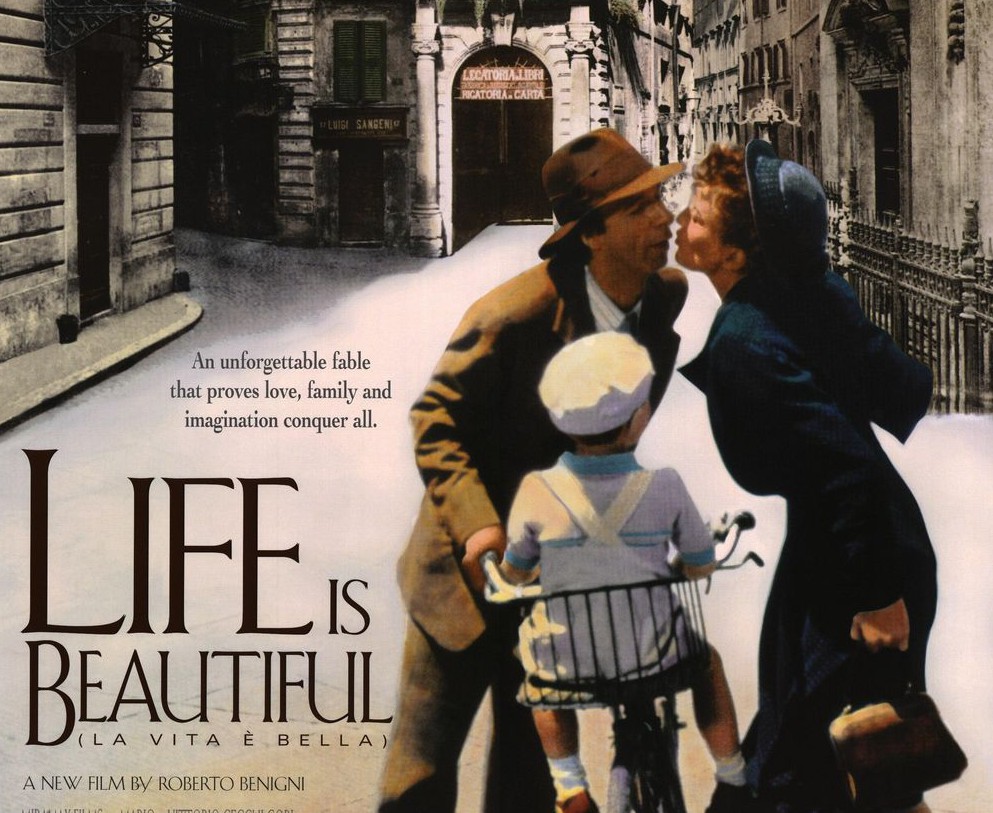A number of years ago a woman I know appeared on our doorstep in a desperate state, bleeding and crying.
She had been beaten by her husband and was pleading for refuge as she knew he wasn’t far behind.
Sure enough, within minutes he was pounding on the door demanding our friend return home.
I went outside to meet him, only to discover he was with the couple’s young children.
I told him it would not be beneficial for the children to see their mother in the state she was and suggested he take them away.
In his anger, and carrying the smallest child in his arms, he yelled, “Why should I? This is life and they need to see what it’s about”.
Fortunately the husband left without further incident, but the fear in the eyes of those children has been imprinted in my mind.
Who knows what they saw that night, but whatever it was could never be taken away.
So, how much of life’s reality should we expose our children to?
I couldn’t help contrast this incident to the 1997 Italian film, Life is Beautiful in which a Jewish father does his utmost to shield his young son from the horrors of the Nazi concentration camp they had been imprisoned in.
Convincing the boy that the experience is an elaborate game, the father allows him to exist in a cocoon of innocence despite the evil unfolding around him.
I see the above scenarios as polar examples of the approaches parents can adopt.
We can either allow our children’s social, emotional and spiritual development to be dictated by the harsh realities of the world, we can create an illusion by completely shielding them from it, or we can search for a balance somewhere in between.
Tragically, our increasingly secularised society has embraced the approach that is resulting in children being exposed to scenarios and concepts at increasingly earlier ages.
As the boundaries to issues such as sex, violence and drug use are broadened through accelerated media technology, younger generations are being bombarded by images and information far beyond their stage of psycho-sexual development.
As adults we have surrendered to a worldview driven by the desire for self-satisfaction and the residue is filtering through to our children, but rather than protect them from the contamination we have opted to submerge them in it.
Through fear and misguided concern we attempt to stay a step ahead by feeding them information before the world beats us to it, but rather than provide clarity, we have only added to their confusion.
It is both ironic and tragic that we adopt the opposite attitude to our children in regard to their physical well-being.
Cushioned playgrounds, rules such as no cartwheels, handstands, rough and tumble games and running on concrete are adopted in schools, but adult-themed concepts have insidiously manoeuvred their way into media specifically designed for children.
We are reversing God’s intended order. We are encouraging, or even pushing our children into emotional and sexual risk-taking behaviours, yet crushing their sense of exploration, adventure and physical risk-taking.
We are far more likely to allow them to tread into the murky waters of television, magazines and the internet than into the murky waters of a lake in search of tadpoles.
I am not advocating that we create a bubble of false illusion to deny the reality of encroaching secular values, but as Christian parents it is vital that we do not surrender to this prevailing worldview.
I am inspired by the message delivered in the 2009 post-apocalyptic movie, The Road.
The world is in a state of total chaos and a dying father finds himself trekking with his son through wasteland controlled by cannibalistic mobs, in an effort to bring him to a place of safety.
Knowing he will not be with the boy much longer and understanding he cannot preserve his son’s innocence in a world of such depraved morality; he teaches him how to exist within it without becoming prey to its evil.
Look for those “who have the fire burning within them”, he tells him.
In essence, this scenario is no different than the world we live in today.
Our role as Christian parents is not to be naïve to the darkness in the world, but rather than focusing our children’s attention on it, we must firstly enflame the light that lives within them.
Darkness can only be recognised in the context of light.
“I am the light of the world”, said Christ, “Anyone who follows me…will have the light of life” (John 8:12).
